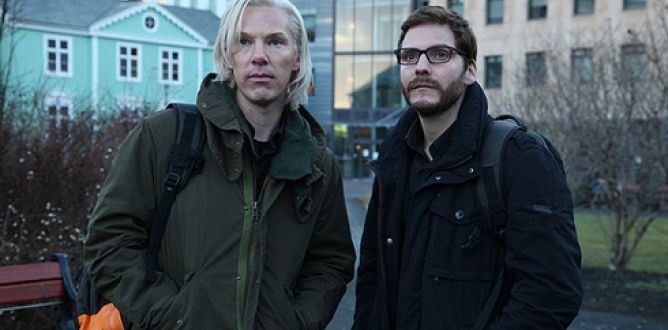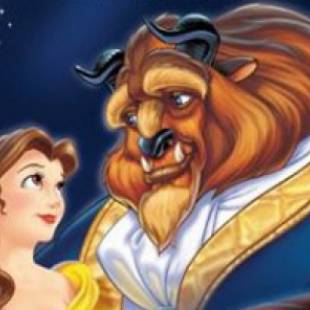The Fifth Estate Parent Guide
"The Fifth Estate" certainly leaves you asking questions. When it comes to deciding if Assange's work makes him a hero or a traitor, the answer will entirely depend on what lens you choose.
Parent Movie Review
In the good old days, theaters used to run a newsreel before the feature presentation. Now with The Fifth Estate, the subject of film itself has barely left the front page. And because the story dramatizing the life of Wikileaks founder Julian Assange is one that is still evolving, it almost seems too early for anyone to really capture a definitive perspective. Regardless, director Bill Condon and screenwriter Josh Singer attempt to do just that, working from books penned by insider Daniel Domscheit-Berg, and journalists David Leigh and Luke Harding.
Although Julian Assange (played by Benedict Cumberbatch) is the principal subject of the movie, point-of-view is everything. In this case the tale of the controversial website creator is seen through the eyes of Daniel Domscheit-Berg (Daniel Brühl) who first meets the white-haired Australian in person at the Chaos Computer Congress in Berlin. Best described as a techno-hippie, Berg watches Assange’s scattered presentation about his novel and safe method for whistleblowers to reveal corruption. While inspired by the cause of true freedom of speech, Burg suspects the real genius of the idea is being obscured by Assange’s tactless demeanor and technospeak. A computer hacker extraordinaire himself, Berg offers his publicity efforts and IT skills to help make Wikileaks successful. Along the way the bespectacled geek also manages to place himself into the wary Assange’s inner-circle.
During the early days the organization focuses on leaks exposing corruption within a Swiss bank and treatment of prisoners at Guantanamo Bay. These altruistic topics are things the two divergent men can agree on—even if their methods are dissimilar. Yet as more “leaks” are published, pressure from governments and media begins to increase. The situation finally reaches a boiling point when Private Bradley Manning provides hundreds of thousands of documents from a U.S. Military database. Wanting to capture the certain publicity that would result from the release of this classified correspondence, Assange is determined to expose the files in their raw format. However Berg is concerned that without redacting the names within the documents, lives will be at risk. The disagreement about pure-verses-censored information, and the ethical implications of each, becomes a sticking point in their working relationship.
Most of the action in this film is a war of words. To break-up some of the heavy dialogue, the moviemakers use artsy symbolism to represent the virtual world in which some of the conflict exists. They also illustrate current events with real news footage (sometimes featuring disturbing images) and the occasional dramatic re-enactment. One of the latter shows the vivid execution of two men with blood effects. As well, a subplot follows a strained romantic relationship that includes implied sexual activity (a man and woman begin undressing each other), along with some sexual references and innuendo.
Another concern for parents considering sharing this film with their teens will be the script’s use of about a half-dozen sexual expletives and a good assortment of other profanities. And this is a shame because the unnecessary language will hamper what I see as the movie’s best use: Stimulating conversation in homes and classrooms on a variety of topics related to media and freedom of information.
Perhaps the most obvious interpretive discussion is the fact the movie is based on Daniel Domscheit-Berg’s book, Inside WikiLeaks: My Time with Julian Assange at the World’s Most Dangerous Website. This bias towards his point of view is one of the many reasons Assange has reacted negatively to this production. (Read this lengthy document, which includes a script sent to Assange prior to the movie’s release and his assertions that much of the movie is pure fiction, including Berg’s relationship with the organization.)
So what is fact and what is fiction? Whose secrets should remain confidential and whose should be exposed? Is there such a thing as truth, or only skewed perspectives? The Fifth Estate certainly does leave you asking questions. And when it comes to deciding if Assange’s work makes him a hero or a traitor, the answer will entirely depend on what lens you chose to view him through.
Directed by Bill Condon. Starring Benedict Cumberbatch, Carice van Houten, Daniel Brühl, Alicia Vikander. Running time: 128 minutes. Theatrical release October 18, 2013. Updated July 17, 2017
The Fifth Estate
Rating & Content Info
Why is The Fifth Estate rated R? The Fifth Estate is rated R by the MPAA for language and some violence.
Violence: Brief explicit violence shows two men shot at point blank range (blood splatters and wounds are shown). News footage includes people being shot, harassed by officials, and civilian deaths in war zones. Characters fear their lives are in danger. Characters engage in illegal activities such as computer hacking and publicly posting classified information. A spy’s life is in peril when he faces exposure. Child abuse is alluded to.
Sexual Content: It is implied an unmarried couple are involved in a sexual relationship. A couple begins embracing, kissing and undressing—but are interrupted. Brief discussions about sex and sexual innuendo are included.
Language: At least six sexual expletives are heard, along with other profanities and terms of deity. Racial slurs are used.
Alcohol / Drug Use: Characters drink frequently, sometimes to relieve stress. Infrequent tobacco use is depicted.
Page last updated July 17, 2017
The Fifth Estate Parents' Guide
Learn more about WikiLeaks, and the real Julian Assange and Daniel Domscheit-Berg.
The movie is based on Daniel Domscheit-Berg’s book,Inside WikiLeaks: My Time with Julian Assange at the World’s Most Dangerous Website, as well asWikiLeaks: Inside Julian Assange’s War on Secrecy by David Leigh and Luke Harding.
Julian Assange corresponded with actor Benedict Cumberbatch earlier in 2013 about the production of this movie. Assange has also posted a detailed list of issues he has with this movie and why the film, from WikiLeaks’ perspective, is “irresponsible, counterproductive and harmful.” (Scroll past the script to the bottom of this lengthy page.)
Home Video
The most recent home video release of The Fifth Estate movie is January 28, 2014. Here are some details…
Home Video Notes: The Fifth Estate
Release Date: 28 January 2014
The Fifth Estate releases to home video (Blu-ray/DVD/Digital Copy) with the following extras:
- The Submission Platform - Visual Effects: From conception and pre-viz, through on-set photography and post, this featurette explores the VFX challenges of bringing the submission platform to life.
- In Camera: Graphics: A study of the techniques and work involved in capturing the on screen graphics in camera, and allowing realistic interaction with the actors’ performances.
- Scoring Secrets: A detailed examination of the soundscape created by both the composer Carter Burwell as he records his score, and the film’s music supervisor as songs are chosen for the unique soundtrack.
- Theatrical Trailers & TV Spots
Related home video titles:
The Social Network follows the life of another influential website inventor, Mark Zuckerberg the creator of Facebook. Jobs is a dramatic retelling of the biography of Steve Jobs, the founder of Apple Computers. And Breach recounts the efforts of the FBI to catch a secrets seller in their ranks.


